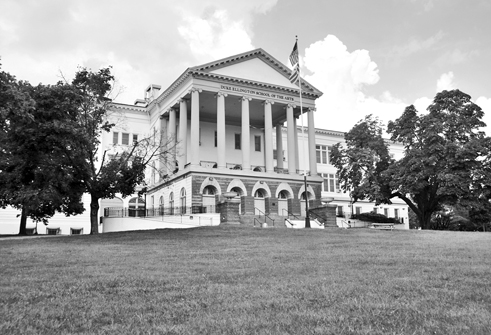Ellington Modernization Project Draws Preservation Objections

By Elizabeth WienerCurrent Staff Writer
The D.C. Historic Preservation Office has moved to oppose key elements of a modernization plan for the Duke Ellington School of the Arts, threatening to delay the $82 million project to renovate and expand performance, rehearsal and academic space at the landmarked school.
Since 1974, Ellington has occupied the 1898 Classical Revival structure originally built as Western High School, and the school community says a modernization is overdue. But the preservation office argued in a written report that the Department of General Services’ plans require too much demolition and would be “inconsistent” with city preservation law.
If the Historic Preservation Review Board follows its general practice of accepting city preservation staff recommendations at a Thursday hearing, the Ellington plan would need modifications or further review by the Mayor’s Agent for Historic Preservation. The mayor’s agent could overturn the board only if he deems demolition necessary for a “project of special merit.”
And in the meantime, city preservation specialist Andrew Lewis is recommending myriad revisions and restudy of plans by cox graae + spack architects and Lance Bailey & Associates, including elimination of a visitor parking lot and reading room, and detailed studies to justify why the school can’t adapt its current auditorium and retain interior space in the rear.
“Although none of Western’s interior spaces have been formally designated, the existing auditorium certainly retains enough historic fabric to contribute to the overall significance of the school. The same can be said for the historic gymnasia and the interior of the back bar which are also proposed for complete demolition,” Lewis wrote in his report to the board.
The Historic Preservation Office opposition isn’t the first stumbling block for the Ellington renovation. Some neighbors and the Georgetown advisory neighborhood commission object to a proposed rooftop performance space and other aspects of the design, including a vehicle entrance on busy Reservoir Road that architects are reconsidering.
But the U.S. Commission of Fine Arts, yet another review body, seemed unmoved by those objections last Thursday, saying operational issues — like noise, lighting and hours for the so-called “Skyview Terrace” — can be worked out between Ellington and its neighbors. The fine arts panel called the overall design concept “very strong,” although it called for some tweaking and a further review.
“I’m confident you can work out functional elements,” commissioner Elizabeth Plater-Zyberk told the architects.
And even the neighborhood objections seem minor compared to the Historic Preservation Office report, which recommends against demolition of the original auditorium and “historic gymnasia,” as well as planned modifications to Ellington’s grand front portico and front lawn designed to improve access to the building.
“Though the need for cutting edge arts facilities is understandable, the proposed concept clearly involves substantial demolition of a historic property,” Lewis wrote.
Architects for the General Services Department say the old auditorium “will never meet needs for high-quality theater space.” Removing it and the gymnasiums leaves room for a glassy atrium, new theater and underground parking, architect Christoffer Graae told the Fine Arts commission.
The current design would add about 108,000 square feet of usable space at the magnet school, as well as allowing a modest increase in enrollment from 541 to 595 students. The city wants to begin construction this June.
“Bottom line for us: Programmatically, these are things we need for our programs,” head of school Rory Pullens told the fine arts panel. “But we are also committed to working with the community, design-wise and use-wise.”
The push-pull of the District’s labyrinthine design review process is not unheard of as various school modernization projects move forward. The same architects worked on Wilson High School’s recent transformation, a widely lauded project that was also delayed when preservation officials insisted on retaining an historic smokestack.
Ellington, too, has a smokestack, and it will be retained. “We learned from the Wilson project,” Graae said.
But other design disagreements with the Historic Preservation Office may prove more challenging. “It also appears unlikely that the concept can be revised in a manner that will make it consistent with [preservation law] and still meet program requirements,” the agency’s report reads.
This article appears in the Jan. 22 issue of The Georgetown Current newspaper.





